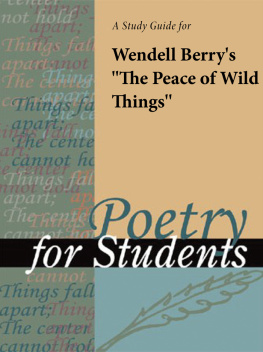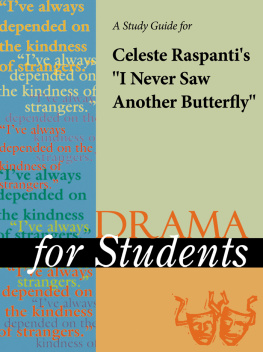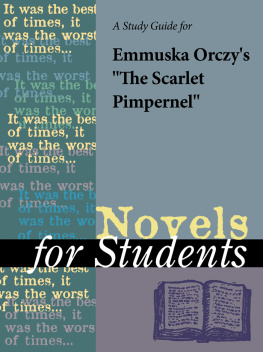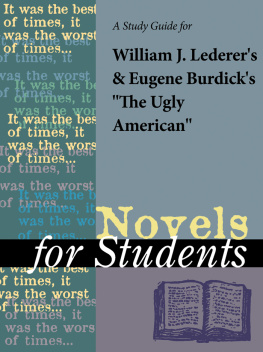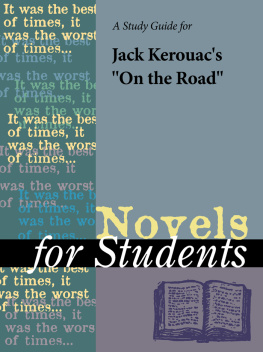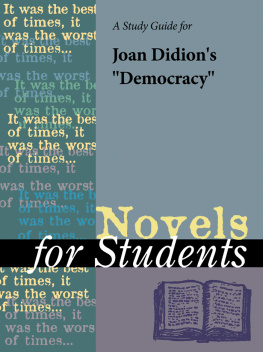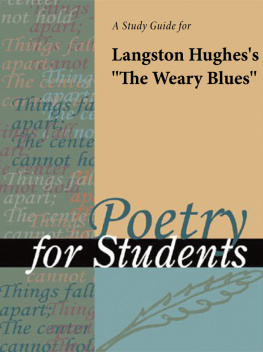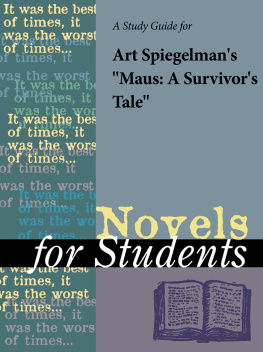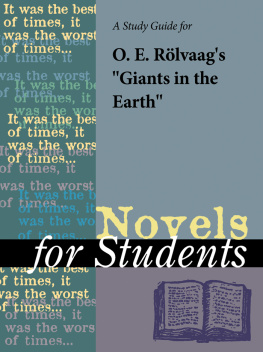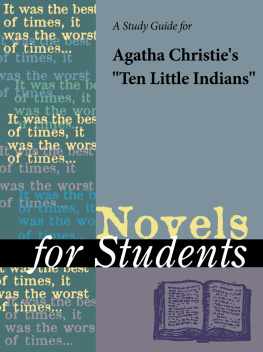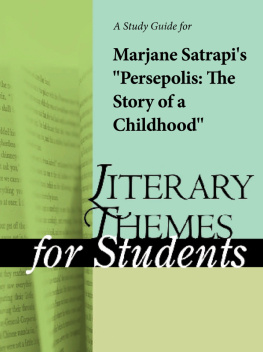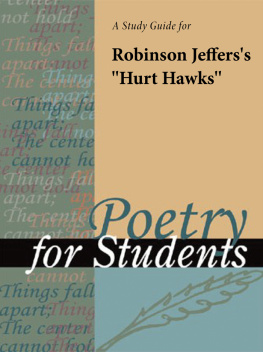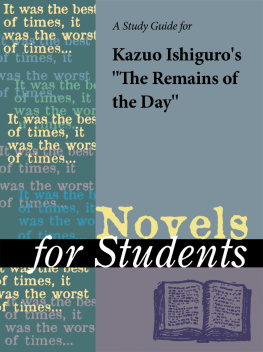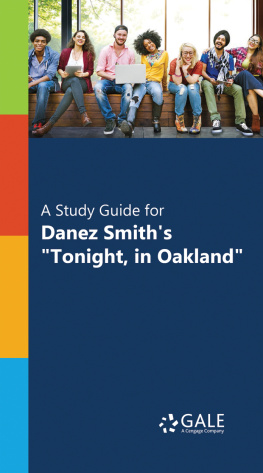TABLE OF CONTENTS
Guide
Poetry for Students, Volume 30
Project Editor: Sara Constantakis
Rights Acquisition and Management: Margaret Chamberlain-Gaston, Jackie Jones, Barb McNeil, Robyn Young
Composition: Evi Abou-El-Seoud
Manufacturing: Drew Kalasky
Imaging: John Watkins
Product Design: Pamela A. E. Galbreath, Jennifer Wahi
Content Conversion: Civie Green, Katrina Coach
Product Manager: Meggin Condino
2009 Gale, Cengage Learning
ALL RIGHTS RESERVED. No part of this work covered by the copyright herein may be reproduced, transmitted, stored, or used in any form or by any means graphic, electronic, or mechanical, including but not limited to photocopying, recording, scanning, digitizing, taping, Web distribution, information networks, or information storage and retrieval systems, except as permitted under Section 107 or 108 of the 1976 United States Copyright Act, without the prior written permission of the publisher.
Since this page cannot legibly accommodate all copyright notices, the acknowledgments constitute an extension of the copyright notice.
For product information and technology assistance, contact us at Gale Customer Support, 1-800-877-4253.
For permission to use material from this text or product, submit all requests online at www.cengage.com/permissions.
Further permissions questions can be emailed to permissionrequest@cengage.com
While every effort has been made to ensure the reliability of the information presented in this publication, Gale, a part of Cengage Learning, does not guarantee the accuracy of the data contained herein. Gale accepts no payment for listing; and inclusion in the publication of any organization, agency, institution, publication, service, or individual does not imply endorsement of the editors or publisher. Errors brought to the attention of the publisher and verified to the satisfaction of the publisher will be corrected in future editions.
Gale
27500 Drake Rd.
Farmington Hills, MI, 48331-3535
ISBN-13: 978-1-4144-2147-6
ISBN-10: 1-4144-2147-8
ISSN 1094-7019
This title is also available as an e-book.
ISBN-13: 978-1-4144-4951-7
ISBN-10: 1-4144-4951-8
Contact your Gale, a part of Cengage Learning sales representative for ordering information.
Printed in the United States of America
1 2 3 4 5 6 7 13 12 11 10 09 08
The Peace of Wild Things
Wendell Berry
1968
Introduction
"The Peace of Wild Things" is a poem by American poet, novelist, essayist, farmer, and environmentalist Wendell Berry. It was first published in Openings: Poems (1968), one of Berry's early collections of poetry, and was reprinted in 1985 in Berry's Collected Poems, 1957-1982. Written in the first-person, "The Peace of Wild Things" describes how the speaker finds a solution to the anxieties he feels during a sleepless night by going outside to a quiet, peaceful place in nature, near a body of water. In the presence of wildlife, water, and stars, he feels restored to equanimity, his troubles dissolving in the great peace he experiences in nature. "The Peace of Wild Things" is typical of Berry's work as a whole in that it attempts to find a balance between humans and nature; it shows how the natural world can play a vital role in healing the troubled human spirit. The poem belongs in the great tradition of nature writing in American literature, as embodied in the work of such classic authors as Henry David Thoreau, Ralph Waldo Emerson, and John Muir, and modern writers such as Annie Dillard, Mary Oliver, Edward Abbey, Loren Eiseley, and many others.
Author Biography
Wendell Berry was born on August 5, 1934, in Henry County, Kentucky, the eldest son of John and Virginia Berry. His father was a tobacco farmer, and both sides of the family had lived and farmed in Henry County for over a hundred years.
Berry attended the University of Kentucky at Lexington, graduating with a bachelor of arts degree in English in 1956 and a master of arts in English in 1957. He married Tanya Amyx that same year. Berry then studied at Stanford University's creative writing program on a Wallace Stegner fellowship, and in 1960 published his first novel, Nathan Coulter: A Novel. It was set, like almost all of his later fiction, in the fictional Kentucky town of Port William.
A Guggenheim Foundation Fellowship enabled Berry to travel to Italy and France in 1961, and in 1962 he taught English at New York University's University College in the Bronx. In 1964, he began teaching creative writing at the University of Kentucky.
It was during the 1960s that Berry first made his mark as a poet, with his collections The Broken Ground (1964) and Openings: Poems (1968). The latter contained the poem "The Peace of Wild Things." He also wrote his first book of essays, The Long-Legged House, in 1969.
In 1964, Berry and his wife purchased a farm in Henry County, Kentucky, and a year later became farmers of tobacco, corn, and small grains. Berry remained a member of the faculty at the University of Kentucky until 1977, when he resigned so that he could spend more time on his farm.
He continued to publish poetry at a steady rate, his books including Farming: A Handbook (1970), The Country of Marriage (1973), Clearing (1977),A Part (1980), and The Wheel (1982). Many of these poems deal with the natural world and the place of humans in it, often touching on spiritual matters. Berry's Collected Poems, 1957-1982 was published in 1985. His essay collections from this period include A Continuous Harmony: Essays Cultural and Agricultural (1972) and The Unsettling of America: Culture and Agriculture (1977).
In 1987, Berry returned to teaching at the University of Kentucky, continuing until 1993, when once more he retired to his farm.
His later publications include Life Is a Miracle: An Essay against Modern Superstition (2000), That Distant Land: The Collected Stories of Wendell Berry (2002), The Art of the Commonplace: Agrarian Essays of Wendell Berry (2002), The Way of Ignorance (2005), the novels Hannah Coulter (2004) and Andy Catlett: Early Travels (2006), and two collections of poetry, Given: New Poems (2005) and Window Poems (2007).
As of 2008, Berry has written twenty-nine books or chapbooks of poems, twenty-seven nonfiction works, mostly essay collections, and fourteen works of fiction, including novels and short stories. He has received numerous awards, especially for his poetry. These include Poetry magazine's Vachel Lindsay Prize in 1962 and its Bess Hokin Prize in 1967, the Aiken-Taylor Award for Poetry from the Sewanee Review in 1994, and the T. S. Eliot Award from the Ingersoll Foundation in 1994.
Themes
The Human World versus the Natural World
The poem contrasts the turbulence of the human world, and the workings of the human mind, with the peace of the natural world. Human life is chaotic and dangerous. People are unable to live at peace with one another, and the news always seems to be bad. The poem was published in 1968 when the Vietnam conflict was at its height, and in the United States, Senator Robert Kennedy and the Reverend Martin Luther King, Jr. were assassinated. It is perhaps not surprising that someone writing during those turbulent times should sink into despair regarding the human condition. The poet cannot separate himself from the larger fate of the world, which he fears may eventually touch him and his children personally. It is notable that he seems most worried about something that has not yet happened but may happen in the future, and this is why he cannot sleep at night, or is frequently awakened and immediately starts to worry. In this capacity to envision and worry about the future, something that does not in fact exist, human beings separate themselves from the natural world of which they remain a part, since no other living creature has the capacity to imagine the future, let alone worry about it.

